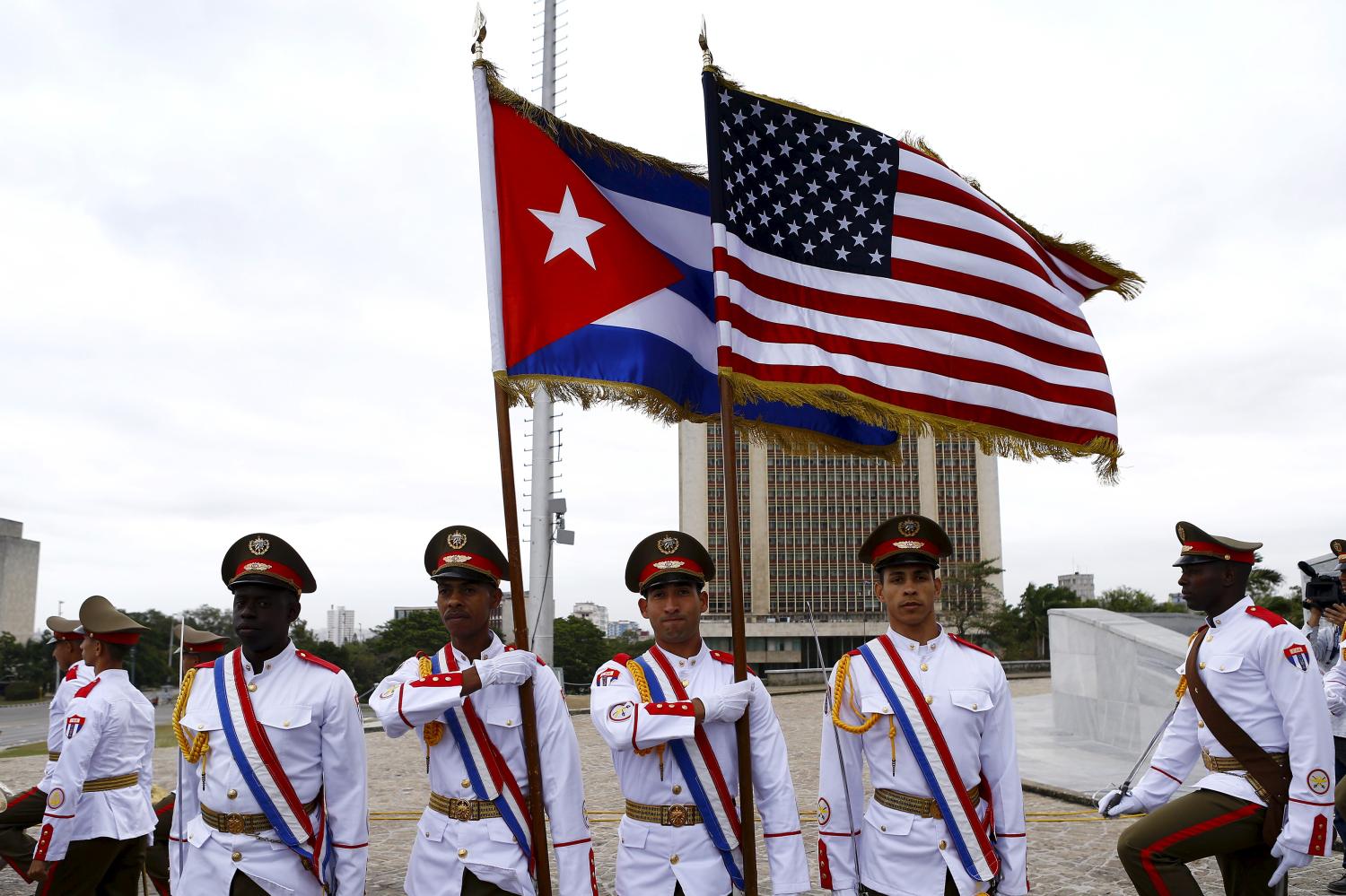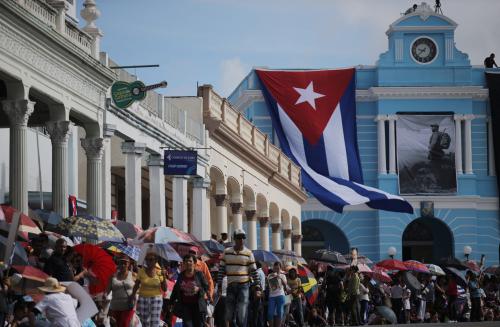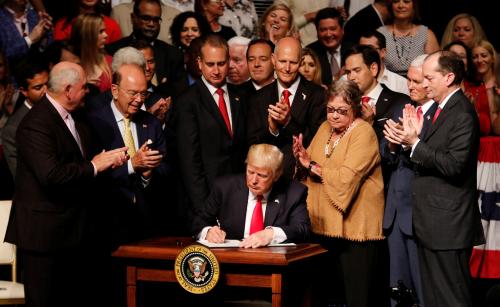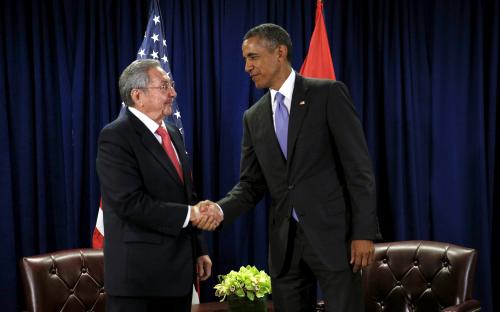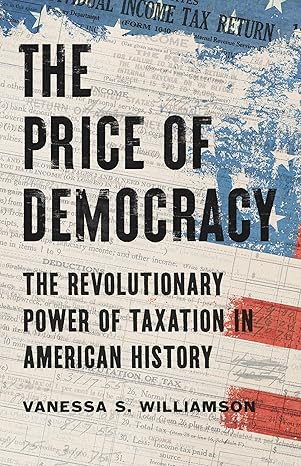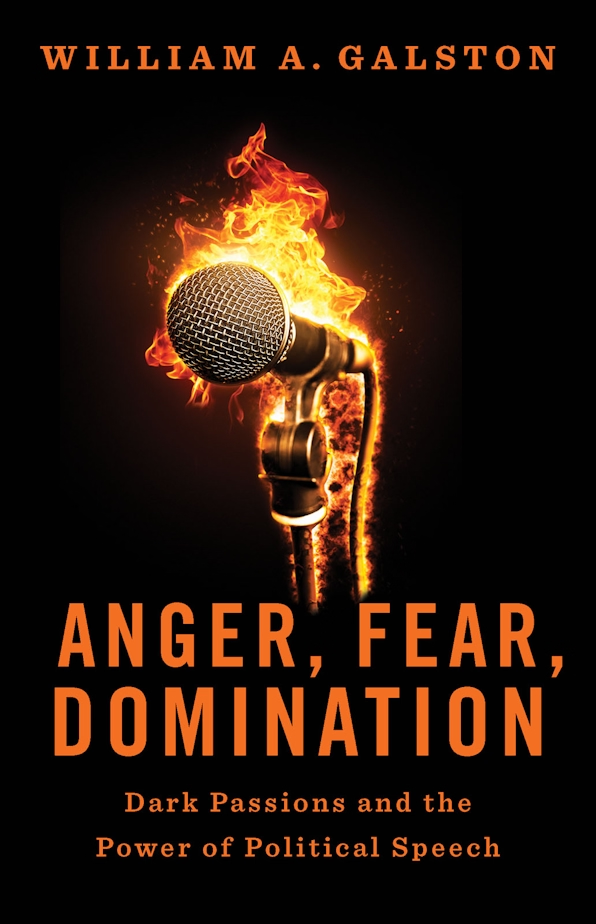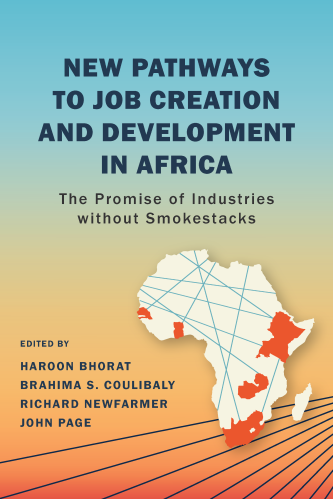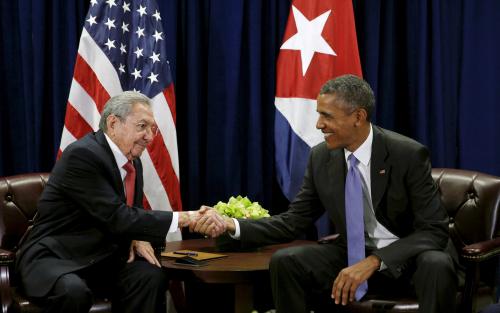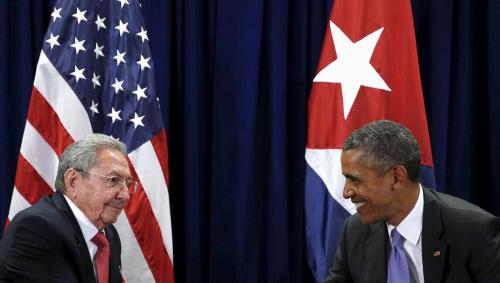This piece will be included as a chapter in the forthcoming book Cuba-US Relations: Normalization and Its Challenges (Columbia University Cuba Program, 2017).
The December 17, 2014, announcements by Presidents Barack Obama and Raúl Castro that the United States and Cuba had agreed to reestablish diplomatic relations (known as D17) was a watershed moment in U.S.-Cuba relations. After an extended period of hostilities and antagonism, D17 opened a new, more positive chapter in the way these two countries relate to one another as sovereign nations. This is not merely a theoretical or rhetorical issue: it goes to the heart of Cuba’s longstanding quest for true independence. Yet the two states understand the critical concept of sovereignty very differently, or at least emphasize different aspects of it, and have lived it in asymmetrical ways. In an effort to help these two nations live out their differences in peace while also finding new opportunities for dialogue and cooperation, it is useful to examine areas where they may agree on the concept of sovereignty as well as where they disagree. Developing a mutual understanding and respect for where each other stands on this concept will support the next stage of closer relations and consolidate this pivotal shift towards normalization.
To tackle this thorny subject, we will discuss different elements of classical and modern definitions of sovereignty as they apply to the recent history of U.S.-Cuba relations: traditional state sovereignty, economic sovereignty, territorial sovereignty, and popular sovereignty.
Sovereignty Defined
Although understandings of sovereignty have evolved over time, the earliest and most traditional definition asserts that states have the freedom to govern themselves as they choose, with full control over their internal and external affairs and free from interference or intervention (Glanville 2014, 2). This definition shifted after World War II when sovereignty and the reality of the interdependent nature of the modern world were couched in an international and globalizing system of interstate relations grounded in human dignity (Dent et al. 1996, 3). Thus, over time a state’s respect for universal human rights became an important element of the legitimacy of state sovereignty. With the creation of the United Nations based on the sovereign equality of all members, but also on the adoption of the Universal Declaration of Human Rights, member states agreed to establish a set of norms that curtail their own sovereignty to a limited extent in order to better maintain peace and security (Grimm 2015, 84).1 After the Cold War, as democratization trends accelerated and UN member states began to exhibit less tolerance for atrocities like the Rwandan genocide, the concept developed further to reconsider the nonintervention aspect of sovereignty. States began constructing norms to govern interstate actions to protect populations (e.g., humanitarian interventions in Somalia and the Balkans) and hold leaders accountable to their international commitments (e.g., the UN-mandated intervention to restore democratically-elected President Jean-Bertrand Aristide to power in Haiti and the proliferation of regional anti-coup mechanisms in Latin America and elsewhere).
This evolution was underpinned by a contemporary and pragmatic reconciliation of state sovereignty with state responsibility, which led to the adoption by consensus of the Responsibility to Protect (R2P) doctrine at the United Nations in 2005.2 While implementation of R2P has been controversial in places like Libya, it has also played a key role in UN-mandated actions in Côte d’Ivoire and in a number of peacekeeping operations. Today’s conceptualization is termed by some as “humanized sovereignty,” by others as “responsible sovereignty” (Grimm 2015, 125; Jones et al. 2009, 9; Deng et al. 1996). The 1993 Vienna Declaration and Program of Action, which Cuba committed to and has affirmed (Minrex 2003), upholds the notion of “humanized sovereignty” and codifies human rights, declaring that “human rights and fundamental freedoms are the birthright of all human beings; their protection and promotion is the first responsibility of Governments” and asserting that “democracy, development and respect for human rights and fundamental freedoms are interdependent and mutually reinforcing” (United Nations 1993).
When the concept of sovereignty first emerged, the principle of self-determination was paramount; the sovereign (no matter how chosen) was the lawmaker and thus considered to be above scrutiny under the law.3This changed in the 18th century with the American and French revolutions and the adoption of constitutional processes whereby popular sovereignty became the basis of legitimate rule. Popular sovereignty is derived from the consent of the governed and based on the protection of individual rights; when the state fails to protect these rights, the people have the right to dissolve the government and set up new trustees for that protection (Glanville 2014). This is most commonly exercised through regular free and fair elections.
The evolution of sovereignty in Spain and Portugal differs in some critical manners from that of France and England, which had important and lasting implications for Latin American state development (including Cuba) given the colonial relationship. When they were first established in the 15th century, the Spanish colonies were seen more as Queen Isabella’s personal property than property of the Spanish state (Crahan 1982, 25). Therefore, leadership in the New World benefited more from a close and favorable relationship with the crown than anything else. This coupled with the personalistic structures of the Iberian empires meant political participation under colonial rule was contingent on government favor, which reinforced the monarchy as the source of authority—the opposite of the popular sovereignty being consolidated at the same time in the United States and France (Crahan 1982, 28). Furthermore, Spain and Portugal did not develop their modern nation-states until after the imperial period, and so left a legacy of paternalistic leadership that was continued by the caudillos of Latin America. Thus, when the colonies transitioned to become republics—which in practice were power transfers from one group of elites to another more than revolutions as seen in the United States and France, according to Crahan— there were few meaningful protections for individual rights for the new governments to expand or avenues for political participation (Crahan 1982, 35). In the 19th century when constitutions were being drafted, liberal values from France, Britain, and the United States were largely incompatible with the Spanish tradition, leading to strict press laws and limited freedom of worship, in an effort to protect the Catholic Church. Rights were determined by one’s position in the whole and their suspension or restriction was protected in these new constitutions in the name of order, stability, and progress (Loveman 1993, 4).
State sovereignty has been a cornerstone of many regional treaties and charters in the Western Hemisphere, including the 1948 Charter of the Organization of American States. However, it has also been recognized and codified that the protection of human rights and freedom are critical to peace and states should respect human rights (Crahan 2013, 372). Moreover, despite the strong tradition of nonintervention on the basis of respect for state sovereignty, a regional consensus has been growing regarding the necessary conditions for when intervention on behalf of human rights may be permitted, including an immediate threat to fundamental human rights where all other remedies have been exhausted and there is minimal effect on the existing authority structure (e.g., not used for regime change), and the intervention will be of limited duration with minimal use of force that is unlikely to cause greater injury than the threatened violation (Crahan 2013, 373).
Nevertheless, the principle of sovereignty based primarily on the U.S. and French traditions remains the foundational element of interstate relations, reflected in international treaties, founding documents of regional and international organizations, and international laws to which states, including Cuba and the United States, have almost universally subscribed. Yet the vocabulary used to discuss sovereignty diverges among many nations, no more acutely and perhaps with no greater implications than between these two countries.
A Very Brief History of Cuba’s Sovereignty
For most of Cuba’s era of independence (1902–present) it has labored under limited sovereignty, based in part on its history under Spanish rule as previously examined and due to a series of U.S. interventions and controls. U.S. interference began as far back as the U.S. military intervention to support the Cuban war for independence in 1898. Cuba took its first steps toward self-government with the election of the constitutional convention in 1900, but that was followed by the well-known 1901 Platt Amendment—written into the Cuban constitution—which ultimately preserved the U.S. right to intervene in Cuba’s internal affairs, curtailed Cuba’s freedom to enter into treaties with other countries, and monitored its financial relations. From 1906 to 1922, U.S. Marines were sent to the island numerous times to enforce civil peace and protect U.S. commercial interests.4The-e United States also maintained control of an open-ended lease of the Guantánamo Bay land on which it established a 45-square-mile deep water naval base that—despite President Obama’s good-faith efforts to at least close the detention center there—remains active today.5 In 1934, President Franklin D. Roosevelt, as part of his Good Neighbor policy, withdrew the Platt Amendment, one year after the Cuban government renounced it, but kept control of Guantánamo Bay.
Around this same time, Havana hosted the 6th International Conference of American States in 1928. This meeting was relevant for the discussion of the limits on sovereignty. The Cuban delegate asserted at the Conference that complete condemnation of intervention “would result in ‘sanctioning all the inhuman acts committed within determined frontiers,’” and thus there should be limits on nonintervention (Crahan 2013, 372).
In response to the 1959 Cuban Revolution and catalyzed further by the Missile Crisis of 1962 and a series of nationalizations of private property owned by U.S. citizens, the United States withdrew diplomatic recognition of the island and imposed a comprehensive arms and economic embargo; three decades later, the embargo was codified in U.S. law in 1996 after Cuba shot down two aircraft piloted by Cuban exile groups operating out of Florida.6 The United States has also carried out multiple attempts to terminate the Communist Party’s control of the Cuban state. The most well-known of these is the failed Bay of Pigs invasion in 1961, but the year prior President Dwight D. Eisenhower approved a plan to train Cuban exiles to commit violent acts of terrorism within Cuba against civilians, and the CIA trained and commanded pilots to bomb civilian airfields (Alzugaray and Quainton 2011, 77). This is to say nothing of the U.S.-sponsored assassination attempts against Che Guevara and Fidel Castro and suspected U.S. government involvement in attempted kidnappings and disappearances of Cuban nationals and diplomats over the years (Alzugaray and Quainton 2011). U.S. government officials justified some of the terrorist attacks on Cuban soil on the grounds of coercive regime change, which was aimed at fomenting a violent overthrow of the Castro government. Such attacks reinforced the still dominant Cuban view that the superpower United States presented an existential threat to their socialist system and demanded a vigorous defense of traditional concepts of nonintervention in internal affairs and self-determination, concepts hardwired in Cuban diplomacy. In addition to battling in the halls of the United Nations, Cuba retaliated against those attacks in other ways, including sending five Cuban agents to the United States to obtain information about planned terrorist activities against Cuba (known as the Cuban Five), providing support for revolutionary forces in Central America and Southern Africa, and providing safe harbor for fugitives fleeing U.S. justice (Alzugaray and Quainton 2011). Cuba also turned to the Soviet Union as its chief sponsor and ally and developed a complex relationship that created dependencies that also impinged on its sovereignty.7
The facts are clear: for much of its history as a modern nation state, Cuba has been unable to fully exercise its sovereign authority in the international system. Now fast forward to December 17, 2014: For the first time since President Franklin D. Roosevelt articulated his Good Neighbor policy, the president of the United States stated that he was prepared to accept Cuba as a sovereign nation based on mutual respect. Seven months later, the two governments agreed to reestablish diplomatic relations after more than five decades of frozen relations, hostilities, and isolation. This was a major breakthrough—the formal recognition of Cuba’s right to sovereign equality under the Vienna Convention and other norms of international law. Also that year, President Obama removed Cuba from the list of State Sponsors of Terrorism, another critical step in recognizing the realities of today’s Cuba, one which no longer supports international terrorism (though still harbors U.S. fugitives, a matter being addressed through bilateral dialogue). Among other things, this step restored Cuba’s sovereign immunity in U.S. courts after years of civil judgments that found Cuba liable for billions of dollars in damages to U.S. plaintiffs. He further instructed his cabinet to begin a series of talks and negotiations on a wide variety of issues ranging from environmental protection to counternarcotics and postal relations, all on the basis of sovereign equality. This was an indispensable foundation on which to start the process of full normalization.
Three Facets of Cuba’s Limited Sovereignty
Despite the events of recent years, three elements of Cuba’s sovereignty remain compromised. First and foremost is Cuba’s economic sovereignty. Under U.S. law, Cuba faces one of the most onerous set of U.S. sanctions of any country in the world. This includes a prohibition on U.S. investment in and trade with Cuba (with exceptions for food, medical supplies, and some telecommunications when paid for in cash in advance), a freeze on Cuban government assets in the United States, the elimination of all U.S. tourist travel to Cuba, and limitations on financial transactions, with burdensome penalties being levied on international banks that commit violations. In practice, the financial restrictions are extended to third parties because most financial transactions run through U.S. banks; similarly, the trade restrictions have wide impact since freight until October 2016 could not be unloaded in the United States from vessels that have visited Cuba within the previous 180 days without a specific license from the Treasury Department (Sullivan 2016, 20).
President Obama is committed to easing the embargo where he can and took several steps in 2015 to allow greater travel, trade, and exchanges (U.S. Department of Treasury 2015). He can do more—U.S. legal experts have made a persuasive case for this—and are expected to take additional measures as the normalization process unfolds in 2016. Such actions could include expanding people-to-people travel to license individuals to travel under the authorized category of “support for the Cuban people,” extending educational travel beyond credit-granting programs, more liberally interpreting current statutes regulating the sale of medical products, further clarifying banking and finance regulations, and permitting U.S. insurers to sell a broad range of policies and products to non-U.S. travelers and carrier service providers (Propst 2015).
On October 14, 2016 the Obama administration further relaxed some restrictions.
The regulations announced in January 2016 which made possible the reestablishment of commercial flights between the two countries and further liberalized financing terms for exports to Cuba were a useful next step, but much more remains to be done to attract business and assure U.S. banks of when and how they can do business without running afoul of regulations as currently written. These efforts could be advanced by the next U.S. president if he or she is so inclined, or could be reversed. But the core of the embargo remains in place and requires congressional action to lift it. To that end, President Obama has called on Congress to repeal the embargo (or “blockade” in Cuban parlance) without conditions, a long-standing demand of the Cuban government. Various factions of the U.S. Congress in both houses and on both sides of the aisle have mobilized to ease or lift the embargo, but due to strong opposition in the Republican leadership, no action is expected in the near future Conditions placed on lifting the embargo as currently codified include the establishment of a democratically elected government in Cuba, a transition government expected to lead to a government that does not include Fidel or Raúl Castro, as well as the resolution of outstanding certified U.S. property claims in Cuba (Libertad Act 1996, Sections 204–207;, Feinberg 2015). Unless Congress rescinds or otherwise reforms the current laws governing the embargo, these large hurdles would have to be cleared to resume a fully normal economic relationship that acknowledges and respects Cuba’s economic sovereignty.
Secondly, Cuba’s sovereign control over its own territory has been traditionally limited. U.S. control of the site at Guantánamo Bay has had multiple uses over the years but its current use as a camp for detaining “Global War on Terror” prisoners outside the law is shameful. President Obama, to his credit, is trying to end this practice but Congress opposes him and he seems unlikely to succeed before his term in office concludes. If and when the detention center is closed, there will be a strong argument—both legal, in light of normalizing relations, as well as practical—for finally returning Guantánamo Bay to Cuba. Some observers have even suggested creative uses for the site going forward that would benefit Cuba and the region, such as converting it to a research and education center (Pickering 2015). The Cuban government has made it clear that the return of the site at Guantánamo Bay is a requirement for full normalization, and it is equally clear that it is a critical step in fully recognizing and respecting Cuba’s territorial sovereignty.
Another unresolved aspect of territorial sovereignty concerns the nearly 6,000 outstanding U.S. property claims. Bilateral talks on this topic are finally underway, starting in December 2015. On this issue, there is some common ground. Both countries recognize that a government has a sovereign right to nationalize property contingent on adequate and effective compensation for the takings (Feinberg 2015, 8–10). Indeed, Cuba has settled a number of property claims with countries such as Canada, Spain, France, Switzerland, and the United Kingdom, so there is clearly room for negotiation and resolution (Feinberg 2015, 11). This matter fits more squarely within a classical definition of sovereignty which Cuba typically relies on and thus may be a matter the two governments can see eye to eye on, politics aside. Cuba’s claim for damages associated with the embargo, on the other hand, could complicate matters.
The final aspect of sovereignty to consider is popular sovereignty. This is perhaps the most sensitive and widest gap between the two countries. Under international law, as well as both the U.S. and Cuban constitutions, the people are sovereign and the source of governmental authority rests with them (Deng et al. 1996; Glanville 2014; U.S. Constitution; Constitution of Republic of Cuba). But the two countries have very different ideas with respect to how the people exercise their sovereignty.
International law, including the Universal Declaration of Human Rights and the International Covenant on Civil and Political Rights (ICCPR), enshrines the notion that government authority stems from the will of the people. As article 21(3) of the Universal Declaration of Human Rights states: “The will of the people shall be the basis of the authority of government; this will shall be expressed in periodic and genuine elections” to be held in an environment of respect for civil and political rights (United Nations 1948). Such an environment would include giving citizens a right to freely express their views, receive information from independent sources, freely assemble and form organizations, allow independent election monitors, and other similar civil and political rights. Seeking out the expression of the will of the people in this manner provides a mechanism of regular accountability between the governors and the governed, in keeping with more modern accepted norms of the responsibility inherent in sovereignty (Arthur 1996; Deng et al. 1996; Chambers 2004; Glanville 2014; Lagon and Kaminski 2014).
Cuba has a very different model. The Cuban Constitution itself states that “[I]n the Republic of Cuba, the sovereignty resides in the people, from whom all of the power of the State emanates” (Cuban Constitution, Art. 3). Yet, according to Cuba’s leadership, the will of the people was fully expressed in the 1959 Revolution; consultations through Communist Party structures and mass organizations, referenda, and elections to the People’s Assembly, in their view, are adequate to meet the requirements of popular sovereignty.8 Some sovereignty scholars argue that sovereignty and liberal democracy are not prerequisites of one another and in fact do not necessarily go hand-in-hand, by extension supporting—or at least not negating—Cuba’s approach as a legitimate expression of its sovereignty (Tansy 2010). This stands in contrast to periodic opportunities for holding leaders to account through regular, free, and fair elections prevalent in most other countries around the world.
In addition to the obvious tension between these principles and universal human rights norms which Cuba (and the United States) have accepted under international treaties like the ICCPR is the question of international scrutiny of state behavior on these matters. In this regard, Cuba, like the United States, has a mixed record. It has accepted UN mechanisms like the Universal Periodic Review (UPR), a process by which states systematically and publicly examine one another’s human rights records and offer recommendations for improvement. It has a 100 percent participation rate and Cuba, like the United States, has fully engaged as both a peer reviewer and a state under review. Cuba has even accepted upwards of two-thirds of the recommendations offered to it by other countries to improve its human rights practices, although less than one third of the accepted recommendations were robust, action-oriented recommendations (Universal Periodic Review Info 2015). By acceding to these mechanisms, Cuba accepts the principle of international scrutiny of its human rights record, just as the United States and every other nation in the world does and just as scholars have asserted is required in the modern, “humanized” understanding of sovereignty (Grimm 2015, 125). Thus, on this point there is some agreement between the two states.
Cuba is no stranger to the UN human rights system in other ways, either. For example, it has a strong record on delivering economic and social rights, which Cubans proudly tout as a key achievement of the Revolution. Not only has it lived up to its commitments domestically by extending such rights to all citizens, but Cuba has stood as a champion for economic and social rights on various platforms at the UN. For example, nearly all of the fifteen resolutions for which Cuba was a primary sponsor at the UN Human Rights Council in 2015 fell in this category. By objective measures like the UN Development Program’s Human Development Index, Cuba has much to offer the rest of the world in terms of the progress it has made in delivering universal rights to education and health care.
On the other hand, Cuba has fallen short of its numerous commitments to upholding international labor standards, despite having extensive language protecting workers’ rights in its constitution. As of January 2016, Cuba had ratified ninety International Labor Organization (ILO) conventions, including eight of eight fundamental conventions, the most recent of which was ratified in September 2015—so it is still actively engaging with the ILO. By comparison, the United States has only ratified fourteen conventions, and two of eight fundamental conventions, the latest of which was in February 2001. These numbers reveal a clear divergence in terms of each government’s official commitment to ILO labor standards; in practice, the two states’ behavior and policies dramatically diverge as well. Through its ILO membership, Cuba has addressed sixteen freedoms of association complaints, the most recent of which was filed in 2003 and closed in 2006 with the inspection committee expressing regret that the Cuban government had not done more to heed its recommendations. The complaint addressed Cuba’s recognition of only one official, state-controlled trade union, and the hostile environment for independent trade unions (which are prohibited), including arrest and harassment of trade union members, lack of legal right to strike or bargain collectively, and the infiltration of state agents into the independent trade union movement (International Labor Organization 2006). This case, just one example, further reveals the tension between Cuba’s closed political system and its supposed commitment to universal labor rights.
In addition to an embargo conditioned on the establishment of democracy on the island, for many years the U.S. Congress has earmarked approximately $20 million per year for democracy promotion programs in an effort to foster popular resistance, overthrow the Castros, and pressure Cuba to adhere to international norms of civil and political rights. A few of these programs have been innocuous enough in their support of a weak and suppressed Cuban opposition, democratic forces, and human rights defenders. But many have been decidedly acerbic to bilateral relations by—in the Cuban view—manipulating Cuba’s internal affairs by attempting to recruit participants covertly into fomenting dissent or actively overthrowing the Castro regime. Zunzuneo, the “Cuban Twitter” program crudely designed to provoke opposition through social media, is but one recent and highly publicized example (which failed). Alan Gross came to embody both the face of U.S. democracy promotion efforts in Cuba and the tension it fosters. Gross, a USAID government contractor working reportedly to expand internet access for religious communities on the island using these democracy promotion funds, was arrested in 2009 for “acts against the independence and territorial integrity of the state,” and sentenced to fifteen years (Popular Provincial Court 2011). The United States had hoisted itself by its own petard as the Alan Gross situation came to define bilateral relations before finally reaching resolution when Cuba released Gross on humanitarian grounds as part of D17.9 In addition to these highly publicized examples of programs funded by the $20 million yearly earmark, since 1984 the United States has also appropriated an additional $797 million in total ($27 million in FY2015 alone) to run Radio and TV Martí (Sullivan 2016, 48). These U.S.-based broadcasts meant to foment anti-Castro sentiment reach only a very small audience on the island and have been less than successful in turning the tide in favor of democracy than offending Cuban pride and fueling the simmering tension.
Because of this long history of U.S. attempts to overthrow the Cuban system, the embargo and issues like U.S. democracy programs in Cuba, the legacy on this issue is harshly bitter and acutely felt. These approaches have been harmful to the bilateral relationship and of highly questionable impact. It is difficult to have a frank conversation on this topic because it hits at fundamental existential questions. In their D17 speeches, both presidents expressed an understanding of their deep differences on democracy, human rights, and foreign policy, but also a genuine willingness and commitment to dialogue on these issues (“Speech by Cuban President” 2014; White House 2014). While both states appear open to a respectful dialogue on these important issues, the bilateral talks on human rights did not begin until March 31, 2015.
Concluding Observations
In light of the developments of D17 and a mutual desire to coexist more peacefully, what should the United States and Cuba do next? On the U.S. side, the government—including Congress—will have to revisit its democracy promotion programs if it is to make good on its stated promise to let the Cuban people determine their own future. President Obama has advanced far in this direction by acknowledging that the United States is no longer in the business of regime change and calling on Congress to lift the embargo (White House 2015). His historic trip to the island in March 2016 continued building momentum toward normalization and pressure for lifting the embargo. The president can make additional regulatory reforms, but it is Congress that needs to take the next big step. Given the current political landscape this may not happen in the short term, especially if the U.S. government continues to be divided with one party controlling Congress and the other leading the executive branch. Over time, critical constituencies like U.S. agricultural groups, U.S. business councils, the tourism sector, and other facets of the U.S public who want to engage more regularly with their Cuban counterparts will have to convince Congress that it is time to lift the embargo. The travel ban should also be lifted, though as with the embargo, a number of other conditions should be met for this to happen; it is at least a potential middle step toward wholesale repeal of the embargo.
On the Cuban side, as Havana considers how to update its model to achieve prosperous socialism, it faces a dilemma on how to modernize its interpretation of popular sovereignty. How should Cuba exercise popular sovereignty in ways that more closely align with the international treaty commitments it has accepted? Under 2002 amendments to its constitution, Cuba’s socialist system is considered permanent, thereby making more substantial moves toward a more liberal economic system difficult.10Nevertheless, is there a means by which Cuban citizens can more actively participate in building this new model of prosperous socialism in keeping with modern definitions of popular sovereignty, including the holding of free and fair multiparty elections observed and reported on by independent monitors and an independent media? This is for the Cuban people to determine as the nation recovers all aspects of its sovereignty and sheds its Spanish tutorial inheritance in favor of political pluralism as practiced today throughout Spanish Latin America and the Caribbean.
The United States can support the Cuban people in their own process of self-determination, but should not do so through aggressive interventions that punish the entire population as it has through the embargo. The United States is in a sensitive position given the history of hostility and overreach and so must be respectful of Cuban sovereignty while also encouraging Cuba to upgrade its respect for international norms of labor, civil, and political rights. Likewise, the United States can continue to improve its own human rights record and invite more international scrutiny. For example, the United States could come to an agreement on terms for international inspection visits to U.S. prisons, including to the detention center at Guantánamo Bay.11
Over time, the United States and Cuba can enjoy a healthier bilateral relationship as Cuba fully realizes its independence as a sovereign state accountable to its citizens. But success is not guaranteed. With forthcoming leadership changes in both countries (2017 in the United States, 2018 in Cuba), staying on the path of respectful dialogue between equal sovereigns is not a foregone conclusion. It will require patience and a mutual commitment through negotiations on both sides led by strong leaders who are able to consolidate the progress to date and continue to build on it.
-
Footnotes
- Human rights movements sometimes struggle with national sovereignty which they see as offering justification for states to place national interests above universal values to which they have committed to upholding via international agreements (Grimm 2015, 123).
- The responsibility to protect doctrine adopted by UN member states in the 2005 Outcome Document of the World Summit asserts that state sovereignty carries with it an obligation to protect populations from genocide and other crimes against humanity (United Nations 2005, para. 138–140). The State carries the primary responsibility for protecting populations from genocide, war crimes, crimes against humanity, and ethnic cleansing, and their incitement; the international community has a responsibility to encourage and assist States in fulfilling this responsibility; and the international community has a responsibility to use appropriate diplomatic, humanitarian, and other means to protect populations from these crimes. If a State is manifestly failing to protect its populations, the international community must be prepared to take collective action to protect populations, in accordance with the Charter of the United Nations (United Nations 2009). It has been argued that implementation of the principle skews against smaller countries. Individual states are unlikely to go up against a major power (especially a nuclear power) because it would likely result in more harm than good, thereby not fulfilling one of the major responsibilities inherent in R2P (Weiss 2007, 109). This is to say nothing of coalitions, however. For an in depth discussion of legality and legitimacy of intervention, see Weiss.
- Deng et al. (1996, 3) note a corollary to this assumption put forward by scholar Lon L. Fuller in response to arguments post-WWII that those alleged to have committed crimes under Nazi law could not be held liable for acts considered legal under the system unless legislation dictated otherwise. Fuller argues that “there is an internal morality to law and that a legal system that so fundamentally violates that morality, as did the Nazi system, loses its legitimacy as law.” This critical observation paves the way for the development of a more modern interpretation of responsible sovereignty.
- The U.S. interventions in 1906 and 1917 were at the invitation of Liberals in Cuba as they revolted, and they welcomed similar interventions in 1919 and 1921 as support for their efforts to wrestle power from the Conservatives (Domínguez 1978, 45).
- Joseph Lazar (1968) offers an extensive exploration of the history of the asymmetric lessor-lessee relationship with regards to the Guantánamo Bay property. In Lazar’s estimation, the lease began during the U.S. occupancy during the war with Spain, was codified in the Paris Treaty of Peace and Platt Amendment, and was extended in the 1934 Treaty of Relations with Cuba, though Cuba retains “ultimate sovereignty” (733, quoting Article III of the 1903 Agreement for Lease). The lease, however, cannot be terminated without the consent of both parties, giving the United States veto power over Cuba’s control of its own territory.
- The embargo was codified in the Cuban Liberty and Democratic Solidarity (LIBERTAD) Act of 1996, also called the Helms-Burton Act, but various facets are maintained through six different U.S. statutes: the Trading with the Enemy Act of 1917, the Foreign Assistance Act of 1961, the Cuban Assets Control Regulations of 1963, the Cuban Democracy Act of 1992, the Trade Sanctions Reform and Export Enhancement Act of 2000, and Helms-Burton (Sullivan 2016, 20).
- U.S. officials for years assumed that the Cuban-Soviet relationship was steady and mutually beneficial for the duration of the Cold War, but Blight and Brenner (2002) offer an in-depth exploration of the immense complexities of the relationship, focusing on 1961 to 1968. Through a combination of archival research and oral history known as critical oral history, they uncover how tensions rose over Cuba’s support for insurgencies in the Third World leading Cuba to undermine the Soviet Union’s leadership in the Third World and the Soviet Union to send insufficient oil to the island starting in 1967 (xxi–xxiii).
- “Historically, the United States has intended to establish its domination and hegemony on our homeland and, since 1959, it has tried to change the political, economic and social system that our people, fully exercising the right to self-determination, has freely chosen.” Remarks made by Cuban Foreign Minister Bruno Rodríguez at October 27, 2015, UN General Assembly (Rodríguez Parilla 2015).
- In addition to releasing Alan Gross on December 17, 2014, Cuba also released a Cuban convicted of spying on behalf of the United States. The United States in turn released the remaining three of the “Cuban 5,” five Cubans convicted of espionage in the United States.
- Bruno Rodríguez stated at the UN General Assembly in October 2015 that “the Cuban people will never renounce its sovereignty or the path that is has freely chosen to build a more just, efficient, prosperous and sustainable socialism,” reinforcing the Cuban government’s strong commitment to protect its socialist model (Rodríguez Parilla 2015). Furthermore, Article 3 of the Cuban Constitution goes so far as to enumerate the right of citizens to fight “using all means, including armed struggle,” against those attempting to overthrow the political, social, and economic order established by the Constitution, though it does not extend the same right of recourse to remedy governmental disregard for popular sovereignty.
- In 2015, UN Special Rapporteur on Torture Juan E. Méndez was denied access to visit Guantánamo; other similar requests have also been blocked.
The Brookings Institution is committed to quality, independence, and impact.
We are supported by a diverse array of funders. In line with our values and policies, each Brookings publication represents the sole views of its author(s).

